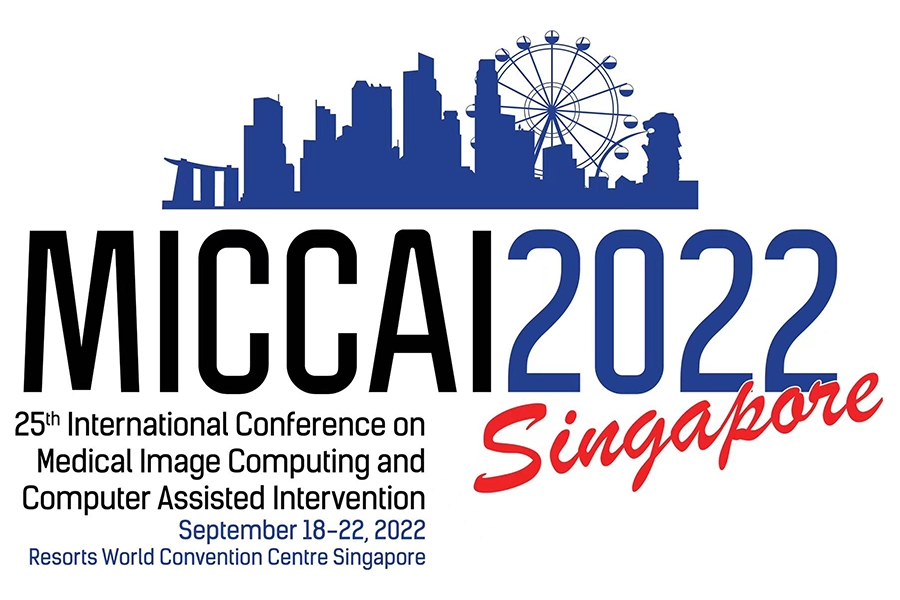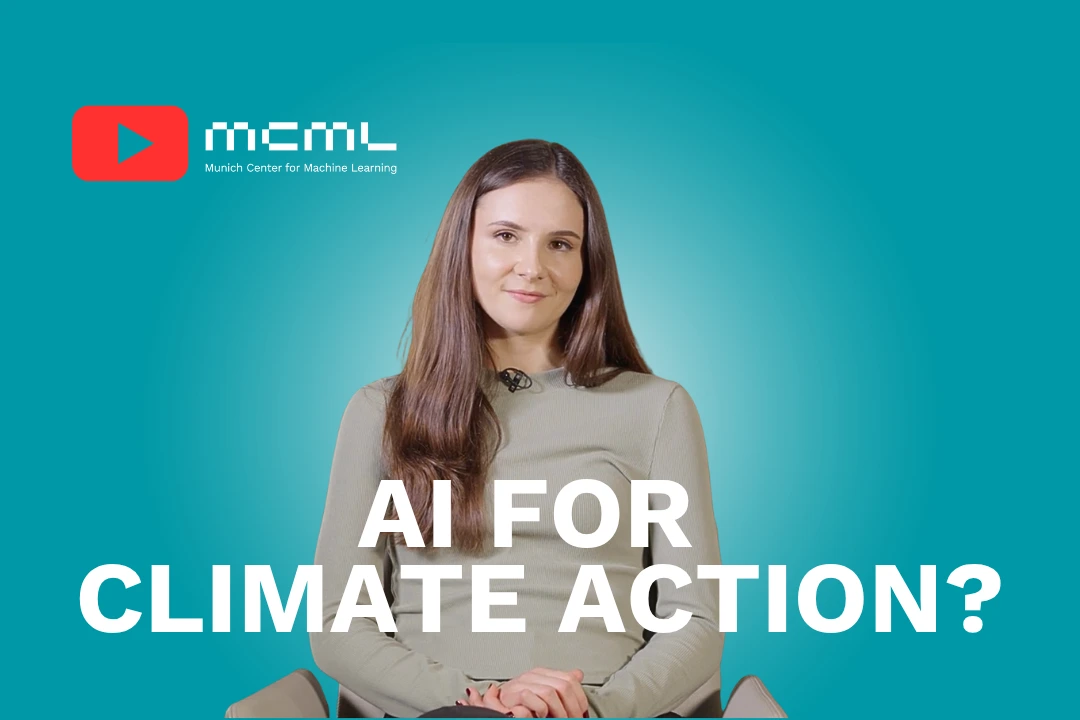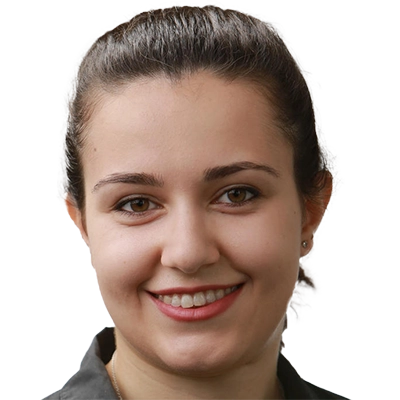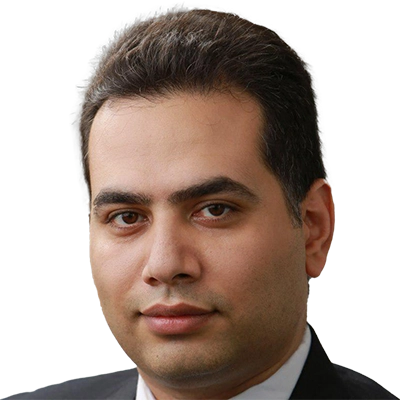13.09.2022

MCML Researchers With Five Papers at MICCAI 2022
25th International Conference on Medical Image Computing and Computer Assisted Intervention (MICCAI 2022). Singapore, 18.09.2022–22.09.2022
We are happy to announce that MCML researchers are represented with five papers at MICCAI 2022. Congrats to our researchers!
Main Track (1 paper)
Y-Net: A Spatiospectral Dual-Encoder Network for Medical Image Segmentation.
MICCAI 2022 - 25th International Conference on Medical Image Computing and Computer Assisted Intervention. Singapore, Sep 18-22, 2022. DOI GitHub
Abstract
Automated segmentation of retinal optical coherence tomography (OCT) images has become an important recent direction in machine learning for medical applications. We hypothesize that the anatomic structure of layers and their high-frequency variation in OCT images make retinal OCT a fitting choice for extracting spectral domain features and combining them with spatial domain features. In this work, we present Y-Net, an architecture that combines the frequency domain features with the image domain to improve the segmentation performance of OCT images. The results of this work demonstrate that the introduction of two branches, one for spectral and one for spatial domain features, brings very significant improvement in fluid segmentation performance and allows outperformance as compared to the well-known U-Net model. Our improvement was 13% on the fluid segmentation dice score and 1.9% on the average dice score. Finally, removing selected frequency ranges in the spectral domain demonstrates the impact of these features on the fluid segmentation outperformance.
MCML Authors
Workshops (4 papers)
Interpretable Vertebral Fracture Diagnosis.
iMIMIC @MICCAI 2022 - Workshop on Interpretability of Machine Intelligence in Medical Image Computing at the 25th International Conference on Medical Image Computing and Computer Assisted Intervention. Singapore, Sep 18-22, 2022. DOI GitHub
Abstract
Do black-box neural network models learn clinically relevant features for fracture diagnosis? The answer not only establishes reliability, quenches scientific curiosity, but also leads to explainable and verbose findings that can assist the radiologists in the final and increase trust. This work identifies the concepts networks use for vertebral fracture diagnosis in CT images. This is achieved by associating concepts to neurons highly correlated with a specific diagnosis in the dataset. The concepts are either associated with neurons by radiologists pre-hoc or are visualized during a specific prediction and left for the user’s interpretation. We evaluate which concepts lead to correct diagnosis and which concepts lead to false positives. The proposed frameworks and analysis pave the way for reliable and explainable vertebral fracture diagnosis.
MCML Authors

Ashkan Khakzar
Dr.
MetaMedSeg: Volumetric Meta-learning for Few-Shot Organ Segmentation.
DART @MICCAI 2022 - 4th Workshop on Domain Adaptation and Representation Transfer at the 25th International Conference on Medical Image Computing and Computer Assisted Intervention. Singapore, Sep 18-22, 2022. DOI GitHub
Abstract
The lack of sufficient annotated image data is a common issue in medical image segmentation. For some organs and densities, the annotation may be scarce, leading to poor model training convergence, while other organs have plenty of annotated data. In this work, we present MetaMedSeg, a gradient-based meta-learning algorithm that redefines the meta-learning task for the volumetric medical data with the goal of capturing the variety between the slices. We also explore different weighting schemes for gradients aggregation, arguing that different tasks might have different complexity and hence, contribute differently to the initialization. We propose an importance-aware weighting scheme to train our model. In the experiments, we evaluate our method on the medical decathlon dataset by extracting 2D slices from CT and MRI volumes of different organs and performing semantic segmentation. The results show that our proposed volumetric task definition leads to up to improvement in terms of IoU compared to related baselines. The proposed update rule is also shown to improve the performance for complex scenarios where the data distribution of the target organ is very different from the source organs.
MCML Authors
Implicit Embeddings via GAN Inversion for High Resolution Chest Radiographs.
MAD @MICCAI 2022 - 1st Workshop on Medical Applications with Disentanglements at the 25th International Conference on Medical Image Computing and Computer Assisted Intervention. Singapore, Sep 18-22, 2022. DOI
Abstract
Generative models allow for the creation of highly realistic artificial samples, opening up promising applications in medical imaging. In this work, we propose a multi-stage encoder-based approach to invert the generator of a generative adversarial network (GAN) for high resolution chest radiographs. This gives direct access to its implicitly formed latent space, makes generative models more accessible to researchers, and enables to apply generative techniques to actual patient’s images. We investigate various applications for this embedding, including image compression, disentanglement in the encoded dataset, guided image manipulation, and creation of stylized samples. We find that this type of GAN inversion is a promising research direction in the domain of chest radiograph modeling and opens up new ways to combine realistic X-ray sample synthesis with radiological image analysis.
MCML Authors

Tobias Weber
* Former Member
FedAP: Adaptive Personalization in Federated Learning for Non-IID Data.
DeCaF FAIR @MICCAI 2022 - 3rd Workshop on Distributed, Collaborative, and Federated Learning, and Affordable AI and Healthcare for Resource Diverse Global Health at the 25th International Conference on Medical Image Computing and Computer Assisted Intervention. Singapore, Sep 18-22, 2022. DOI
Abstract
Federated learning (FL) is a distributed learning method that offers medical institutes the prospect of collaboration in a global model while preserving the privacy of their patients. Although most medical centers conduct similar medical imaging tasks, their differences, such as specializations, number of patients, and devices, lead to distinctive data distributions. Data heterogeneity poses a challenge for FL and the personalization of the local models. In this work, we investigate an adaptive hierarchical clustering method for FL to produce intermediate semi-global models, so clients with similar data distribution have the chance of forming a more specialized model. Our method forms several clusters consisting of clients with the most similar data distributions; then, each cluster continues to train separately. Inside the cluster, we use meta-learning to improve the personalization of the participants’ models. We compare the clustering approach with classical FedAvg and centralized training by evaluating our proposed methods on the HAM10k dataset for skin lesion classification with extreme heterogeneous data distribution. Our experiments demonstrate significant performance gain in heterogeneous distribution compared to standard FL methods in classification accuracy. Moreover, we show that the models converge faster if applied in clusters and outperform centralized training while using only a small subset of data.
MCML Authors
Related

29.09.2025
Machine Learning for Climate Action - With Researcher Kerstin Forster
Kerstin Forster researches how AI can cut emissions, boost renewable energy, and drive corporate sustainability.

26.09.2025
Björn Ommer Featured in WELT
MCML PI Björn Ommer told WELT that AI can never be entirely neutral and that human judgment remains essential.

25.09.2025
Björn Schuller Featured in Macwelt Article
MCML PI Björn Schuller discusses in Macwelt how Apple Watch monitors health, detects subtle changes, and supports early intervention.

24.09.2025
MCML PI Björn Ommer Featured on ZDF NANO Talk
MCML PIs Björn Ommer & Alena Buyx discuss AI’s essence on ZDF NANO Talk, covering tech, ethics, and societal impact.









